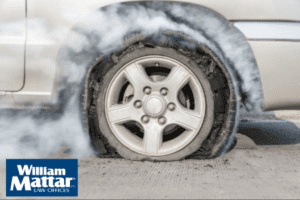
Many components work together in a motor vehicle to keep drivers safe and comfortable. From tires to airbags to steering systems, every part has a function. When one part is defective, collisions and other dangerous incidents can occur which endanger vehicle occupants.
If you’ve been injured by a potentially defective auto part, William Mattar, P.C. may be able to help. We can work to hold the liable companies responsible for the harm of defective motor vehicle products. Call our team today at 844-noswap444-4444 to learn more.
What is Product Liability?
Product liability laws protect consumers against defective products that are unsafe or pose danger. Companies involved in the design, manufacturing, or sale of a particular product can be held responsible for damages in the event of that it causes harm. Product liability cases can involve a wide variety of products, including medical items, food goods, pharmaceuticals, and automobile parts.
When an auto product is found to be defective, a company (such as a vehicle manufacturer) may issue a recall to warn consumers. Since 1966, the National Highway Traffic Safety Administration (NHTSA) has recalled over 390 million motor vehicles for safety-related defects. These recalls include over 46 million tires, 66 million pieces of equipment, and 42 million car seats.
One example of a major recall is the Takata airbag recall, which has affected approximately 67 million vehicles to date. These airbags, produced by the now-defunct Takata Corporation, can explode or rupture when deployed when exposed to high heat and humidity. Takata airbags have caused injuries and deaths of vehicle occupants, with the most recent happening in 2019.
Types of Auto Defects
Auto defects can arise in several potential ways during the design, manufacturing, or marketing of a product. A design defect is as it sounds: a type of flaw that is inherent in the blueprint or design of a product. These defects will typically affect an entire line of products, such as a vehicle model. A defect that occurs during the production/construction process is a manufacturing defect and may only affect a small number of vehicles or products. Lastly, a marketing defect is an error in how a product is presented or marketed to consumers.
Examples of auto parts that can be affected by a defect include but are not limited to:
- Car door;
- Airbags;
- Fuel system;
- Tires;
- Roof (resulting in “roof crush”);
- Seatback;
- Gas tank;
- Steering systems;
- Accelerator controls; and
- Suspension.
If you suspect a defective auto part caused your injuries, contact us right away. We can examine your case to help determine what parties may be liable.
How Can You Be Injured by a Car Defect?
Vehicle occupants can be injured by a defective part itself. For instance, a malfunctioning airbag that deploys and/or ruptures at the wrong time (i.e., not in a collision) can cause serious injuries. Other defects, such as a faulty accelerator that increases a vehicle’s speed suddenly, can contribute to a hazardous accident.
Car defects can also injure occupants at the point of impact in a collision. For example, what is know is “roof crush” can occur when a vehicle rolls or flips, and the roof collapses. In these accidents, occupants can be crushed or ejected from the vehicle. Roof crush can potentially happen a result of a defect, whether in the construction or design of the vehicle’s structural components.
Injured by a Defective Auto Part? Call William Mattar
If you’ve been injured by a defective auto part in Buffalo, contact William Mattar P.C.. Many accident victims can’t work and may experience financial, emotional, and physical stressors due to their injuries. Our accident lawyers help injury victims get the compensation they need to get their lives back on track. Complete our online contact form or call 844-noswap444-4444 to schedule your free initial consultation today.